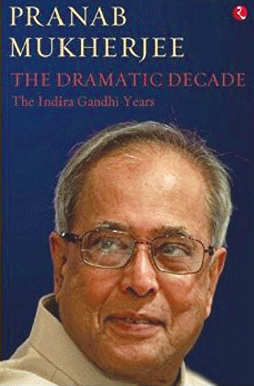
The Dramatic Decade:
The Indira Gandhi years
Pranab Mukherjee
Rupa
Rs 595
It is probably only people over 60 who remember the seventies clearly. That is a pity because it was, as President Pranab Mukherjee calls it in this first volume of his three-part autobiography, a very dramatic decade indeed. It remodelled India politically, economically and socially.
As a junior politician and minister at the time, Mukherjee was not quite at the centre of the decision-making. But far from being a disadvantage, it works in his favour in this book because he is able to narrate some of the key incidents more like an onlooker than a participant.
The author flits over his early life. He says he was not a good student to start with but has improved over the years. He ended up getting an MA degree as well as one in law.
Then he drifted into West Bengal politics. His account of the events there are fascinating as they reveal how personality-driven everything was. In that sense, what’s happening in Bengal now is only a continuation.
Coming to New Delhi, Mukherjee belongs to the generation of Congress politicians who accepted Indira Gandhi’s leadership as an article of faith. He admires her leadership skills, her political understanding, her connect with the people, her nationalism and her ability to bounce back.
This book reminds us of India’s glorious moments like the decisive victory over Pakistan in 1971 when Bangladesh was created. It also reminds us of its lowest point, the Emergency of 1975–77.
This book needs to be read by everyone who is interested in finding out how politics is actually played. As Mukherjee tells it, winning in politics is not very different from winning in business. You win by taking advantage of opportunities.
Indira was a champion at winning and Mukherjee ably shows how and why in this book.

How Modi won it:
Notes from
the 2014 election
Harish Khare
Hatchette
Rs 600
Harish Khare was the Delhi bureau chief of The Hindu from 2002 to 2009, when he was appointed as the media advisor to Prime Minister Manmohan Singh. Thus, like Sanjaya Baru before him, he got a ringside view of both media and politics in Delhi. He has a formidable reputation as a political commentator.
In this book he (it is actually not a book but the notes he made between March and May 2014 about the forthcoming General Election) writes about the processes and events that brought Narendra Modi to power as prime minister. He leaves the reader in no doubt that he is not a Modi admirer.
How valuable these notes will turn out to be will depend on future historians who refer to them. For the moment, it would seem that they are jottings that he had made for writing a proper book, which he never wrote.
Some of it is gossip, which in Delhi usually ends up being true. Some of it relies on informal conversations with people in power. And a lot of it is the opinion of a seasoned observer of power in Delhi.
Overall, in spite of its somewhat heavy style, the volume provides a lot of insight into national and state level politics. But there is no news as such in it.
Should you buy this book and read it? If you are interested in what was happening in the run-up to and during a momentous General Election, yes, you must read it.
Even if a lot of it is subjective opinion, it is still worth reading because Khare is no lightweight commentator. He knows what he is talking about.
His assessment of Modi may not be palatable to a lot of people. But that is the refreshing thing about these notes: they provide a departure from the current atmosphere of Modi bhakti.

Editor Unplugged: Media, Magnates, Netas and Me
Vinod Mehta
Penguin/Viking
Rs 599
Vinod Mehta is a very successful journalist. Until he retired recently, he had been ‘the’ Editor for 40 years, which is a record. During his long career he started several successful publications and newspapers. His last was the Outlook magazine, of which he remained Editor for 17 years.
His most recent claim to fame was his decision to publish the Radia tapes, a decision that led to a huge furore and a near-political crisis. The result was that even a man like Ratan Tata’s reputation was called into question.
This is the second volume of his autobiography. The first, A Lucknow Boy, was published three years ago. In this volume, as the title suggests, he talks about his own experiences with owners of media platforms and politicians. The two books are also very educative about the ways in which Delhi functions.
As he himself says, Mehta has often been called a chamcha (camp-follower) of the Gandhi family, to whom he has devoted an entire chapter. He has also been criticised for being a Modi-hater. He has written a whole chapter about Modi, and says in the last chapter that he is changing his mind. He has begun to see them both in a more realistic light.
Mehta’s views on the media are honest. He says even though it is too early to write off ink-on-paper newspapers, the media generally is full of “rascals,” and journalists are not very high on the respect list of Indians.
The book is full of anecdotes and jokes. It throws light on how politicians think and behave in and out of power, and how in Delhi the only thing that matters is power. Even money doesn’t count for much.
Given how chattily he writes and his slightly self-deprecating style, the two volumes are an excellent read if you happen to be on a short journey.





